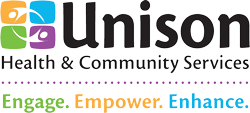Effective April 1, 2020: Temporary Changes for Communicating with Clients (Updated May 1, 2020)
In order to help prevent the spread of COVID-19, Unison will be limiting in-person appointments. E-mail communication or video visits may be offered by your Provider.
E-mail with your Provider
If you use e-mail with your health care provider you should know that there are some risks. There is a lot of cyber-crime on the internet, and your health information can be stolen or disclosed without your consent. Some steps that you can take to protect your personal health information are:
- using your own computer/device (not using an employer’s or someone else’s computer/device);
- e-mailing on your own home internet connection (not on public or guest wifi)
- do not open attachments in e-mails that could be spam (read How to spot phishing e-mails for more information)
We may still need to see you in person. If this is the case, we will let you know.
You should also understand that e-mail is not a substitute for attending the Emergency Department. If you require emergency assistance, call 911.
If you want to stop using e-mail, please let us know. We will reply when you ask us to stop using e-mail, so you know that we got your message.
Unison may decide to stop using e-mail at any time. If we do, we will let you know. We will stop e-mails immediately after we inform you without waiting for your reply. Please make sure you inform us if you change your e-mail address.
Video Visits
Description
- For some appointments, we may ask to use video and audio technology (a video visit) so we can see and hear each other. We will also need to communicate the appointment details with you over email.
- We recommend you be in a quiet, private, safe place for your video visit so that others cannot overhear the session (unless you want to include others in your visit – please tell us who will be with you).
- You will be asked for details of what is happening and your health history – these questions may be very personal and sensitive.
- Details of your video visit will be noted in your health record just like an in-person visit We will not make a recording of the video visit. We ask that you not record the visit either.
- We may ask to take photographs if necessary to treat you – we will ask for your permission before we take any photographs.
Limits
Video visits are not appropriate for emergencies – please call 9-1-1
Some health concerns can be addressed with video visits alone, but in some cases, your doctor may ask you to visit a hospital or other health care facility if necessary, for a physical examination.
We may not be able to have a video visit with you if we need to touch you as part of the examination.
Time for a video visit may be limited based on the availability of our staff during the pandemic.
This service may not be available after the pandemic – we may need to end it at any time.
Privacy
Just like online shopping or email, video visits and email communication have some privacy and security risks that your health information may be stolen or disclosed without your consent. We want to make sure you understand this. In order to improve privacy and confidentiality, you should:
- Understand that this method of communication is not secure in the same way as a private appointment in an exam room.
- Take steps to participate in this video visit in a private space
- Use a private computer/device (i.e., not an employer’s or other person’s computer/device) and a secure internet connection. For example, using a personal computer or tablet is more secure than at a library, and your access to the Internet on your home network will generally be more secure than an open guest Wi-Fi connection.
Our staff who are doing the video visit may be working from home because of the pandemic – they will also try to find a quiet place away from others in their household
Risks
It is possible there could be a problem with the technology and your session could be cut short or interrupted. The quality of the video or audio may not be good enough for a health care provider to assist you by video or could negatively impact the quality of the care you receive. If this happens your appointment will be completed over the phone. If the technology does not work on the day of the visit, the Provider will call you at the telephone number we have listed in your health record.
If you participate in a video visit, you agree to let us collect, use, or disclose your personal health information in order to provide you with care (while following applicable privacy laws) in the same ways that we would collect, use, or disclose your personal health information during/after an in-person visit. You may refuse to participate in a video visit if you do not feel comfortable. In this case, a phone appointment may be offered instead.
